Pros and Cons of Different Varieties of Swimming Pools
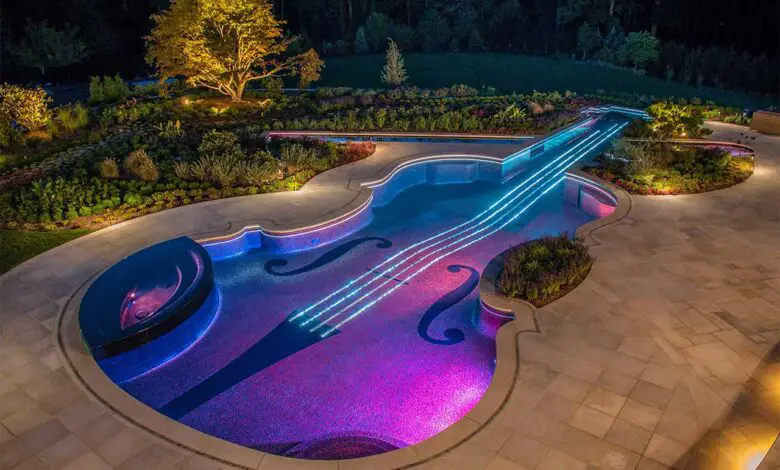
There are a couple of options when it comes to choosing a swimming pool. They include vinyl liner, concrete and fibreglass pools. Each have their pros and cons. We understand purchasing a pool is a big decision and you want to be sure you are choosing the right one. We’ve put together this article to help you decide which pool choice is best for you.
Advantages of a vinyl liner pool

When it comes to the cheapest initial outlay for a pool, a vinyl liner is the front runner. This may appeal to people with a limited budget.
You can choose the shape you want your vinyl liner pool to be
Traditional vinyl liner pools come in a standard rectangle shape, although for an added cost you can customise the size, depth, and shape of your vinyl liner pool.
Disadvantages of a vinyl liner pool
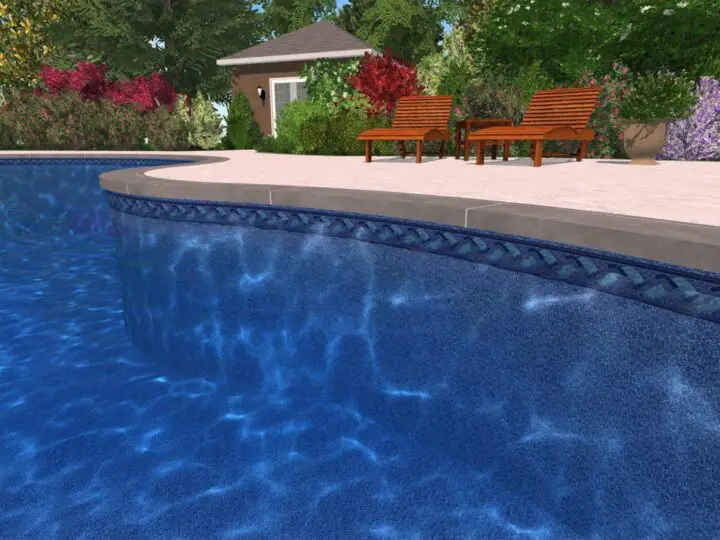
A substantial disadvantage that comes with a vinyl liner pool is that the inner vinyl lining needs replacing every 5 to 10 years. This can become quite expensive over the lifetime of the pool with the average price of a vinyl liner costing approximately $4,000.
The liner isn’t very durable
An additional downfall to owning a vinyl liner pool is that the liner isn’t super durable like the surface or fibreglass and concrete. They are prone to splits and tears. These can be caused by outdoor items getting blown into the pool by wind or dogs scratching the sides.
They can house algae and bacteria
Most of the vinyl lining is nonporous, however ‘dead spots’ such as the seams and under the pool ladder are areas of the pool that are prone to algae and bacteria growth.
Advantages of concrete pools
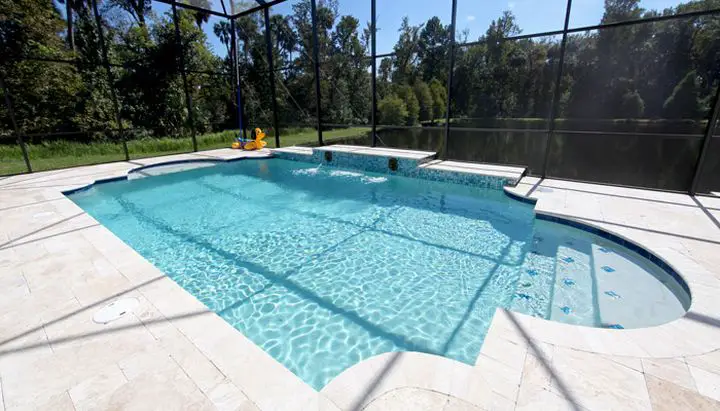
Unlimited shapes, depths, and designs
Possibly the biggest advantage to choosing a concrete pool is having the option to have any design or style you want. Concrete is preferred by people wanting a certain shape or depth for their pool that they cannot find in fibreglass or vinyl liner pools.
Strong and durable
Concrete pools are exceptionally strong and should last more than 25 years. The interior surface will last around 10 years before it will need to be resurfaced.
Disadvantages of a concrete pool
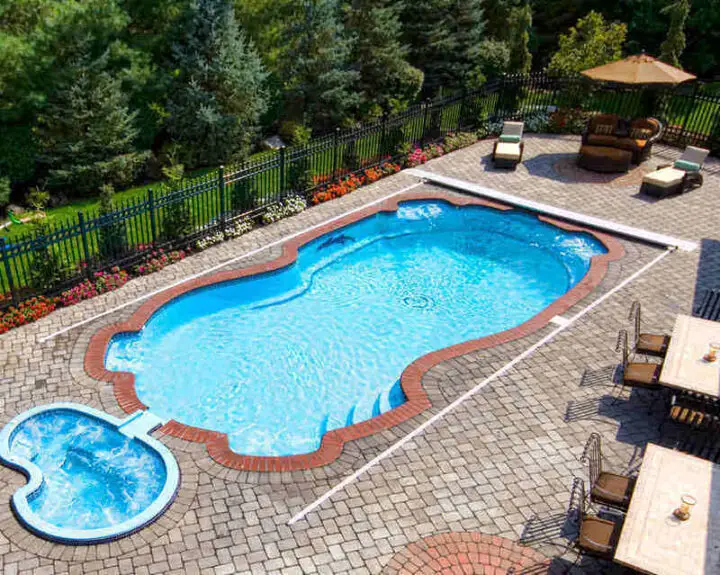
Higher level of maintenance required
The interior surface on concrete pool is highly porous. It creates the perfect environment for bacteria to grow and multiply. They are notorious for algae infestations that can be hard to eradicate. It is suggested to brush the surface every week to avoid this occurring.
Higher doses of chemicals needed
As stated above, concrete pools are susceptible to algae and bacteria, this means you will spend more money on chemicals to resolve the issue. As concrete is alkaline based, it can alter the chemistry levels of your pool water. It will cost more money in chemicals if you are having to balance the levels constantly.
Not a good option for a salt chlorinator system
Whilst you could use salt in a concrete pool, it is not advisable. Salt affects the surface of concrete pools which will result in your pool needing to get resurfaced more often than generally required. Salt for a concrete pool is a highly expensive choice.
Expensive initial and ongoing costs
If you’re looking for an inexpensive pool to build, a concrete pool isn’t the choice for you. An average concrete pool installation is anywhere from $50,000 to $100,000 depending on the size and design you want. They require far more effort and chemicals than vinyl liner and fibreglass pools. They require an acid wash every 3 to 5 years and resurfacing a concrete pool costs around $10,000. This will need to be done every 10 years.
They take a long time to build
Vinyl liner and fibreglass pools take a matter of weeks to install whereas concrete pools can take anywhere from 3 to 6 months to complete.
Advantages of fiberglass pools
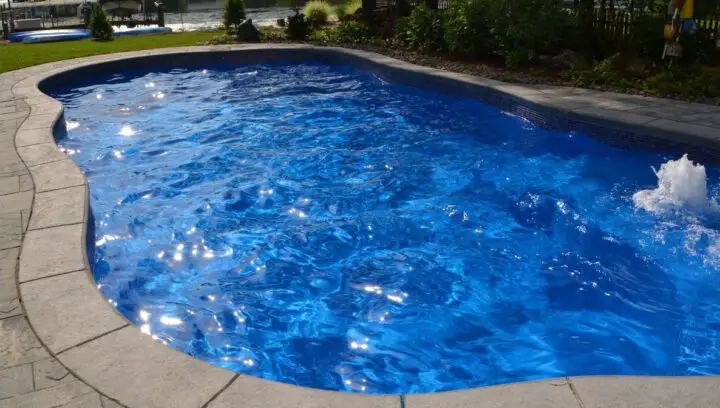
Minimal upkeep required
A benefit of owning a fibreglass pool is that they require very little effort from the homeowner. The interior surface of a fibreglass pool is virtually nonporous making it resistant to algae and bacteria. As a result, they require far less money and time to keep them clean. Fibreglass pool owners generally spend a quarter of the time and money that vinyl liner and concrete pool owners do.
Quick installation
Once you have chosen your pool, it’s just a matter of getting it delivered and installed. This process can take as little as 7 days.
Extreme tactile strength
Advances in fibreglass technology allows them to be built with superior strength. They are designed to have a slight flex to accommodate earth movements and will not puncture or crack over the lifetime of the pool.
Contemporary designs
Most fibreglass pool designs have a modern appearance and if done well can completely transform any backyard into a beautiful focal point.
Suitable for a salt chlorinator system

Salt water is an extremely popular choice as it is not as harsh on the eyes and skin as traditional chlorine. Salt does not damage the interior surface of fibreglass pools. However, it is very abrasive on concrete and it erodes the metal and aluminium coping that is found in vinyl liner pools.
An asset to your property
If you ever make the decision to sell your home want to be sure that the pool you have chosen is going to attract buyers not deter them. Buyers want a pool that is cost effective and simple to look after. A fibreglass pool is the easiest pool on the market to maintain.
They are suitable for practically any site
Fibreglass pools can be built in ground, partially above ground and above ground. They can be constructed to suit virtually any backyard.
Disadvantages of fibreglass pools
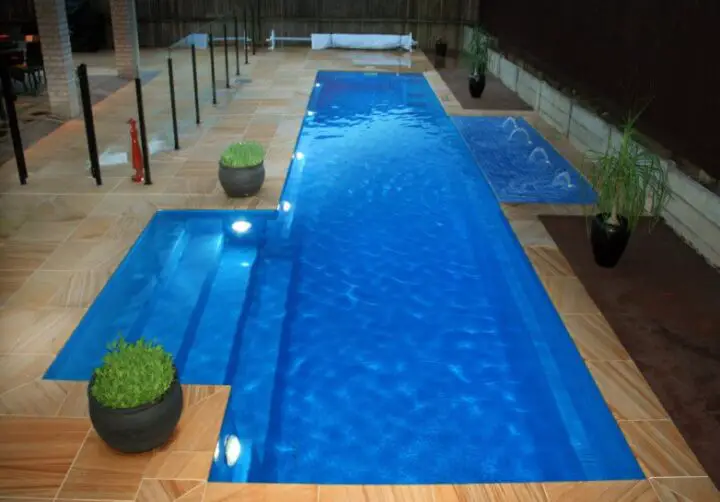
The initial cost is more than vinyl liner pools
It is cheaper to install a vinyl liner pool than a fibreglass pool, however, it is important to consider the ongoing cost that is required of a vinyl liner pool. Replacing the vinyl liner every 5 to 10 years will work out to be far more expensive over the pool’s lifespan. Fibreglass does not need replacing at any time.
A fibreglass pool isn’t customisable
A disadvantage to a fibreglass pool is that you are unable to have an extremely deep pool or a specific shape or design. Although many reputable fibreglass pool companies have a huge selection of pools to choose from. The likelihood of you not finding something to suit your home and lifestyle is slim.
So which pool has more pros than cons?
When it comes to the overall cost across the lifetime of the pool. A fibreglass pool is the best option. They are more money to install initially than vinyl liner pools but don’t need constant interior replacements or resurfacing like vinyl liner and concrete pools do. They are easy to maintain, and they require the least amount of chemicals to keep them clean. Unlike the other types of pools, they are highly compatible with salt water.
If you require further information regarding the suitability of a fibreglass pool for you home, visit newcastleswimmingpools.com and find a suitable pool for yourself.
